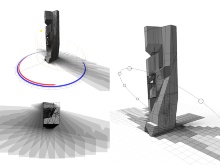Forming Performance
Negotiating Form Generation and Environmental Performance
Design processes in architecture have begun to move from the direct pursuit of form generation to more involved methods where form is realized through the input of parameters regarding use, material, and assembly. As the pragmatics of making buildings become more involved in the process of generating form, the influence of environment has to be considered more intently. Evaluation for the effects of climate on a building form is becoming increasingly common. It is, though, often used in isolation to the architect's design process; analysis induces minimal effects in changing the overall form, only primarily influencing the appendages, the ornament and devices that adorn the building.
This seminar will examine the possibility of a design process that utilizes environmental analysis as an early, initial constraint to influence the shaping of form. We will also look to understand building form as one aspect of a more comprehensive building system. The overall shape of a building can be analyzed to understand the degree of solar radiation to which its surfaces absorb, for example. But this analysis alone ignores the type of functions that occur in various regions within the building form, and the type of thermal loading that these uses produce internally. Through the understanding of design-specific climate engineering princicples, we will develop our own scripted tools to quickly approximate environmental values. The principles will be examined through the use of Ecotect, and the design specific analytical tools will be scripted in Rhino. The skills for these software will be introduced through a pair of intensive 3-day workshops.
The course will be taught in English. The Ecotect and RhinoScript workshops will be required for all participants of the seminar. Those taking part in the Design Studio: Evolving Systems of Material and Performance will be required to take this seminar. Knowledge in RhinoScript, or other scripting languages, will be helpful, but not necessary.


